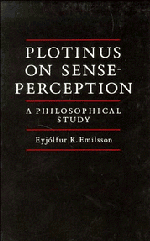Book contents
- Frontmatter
- Contents
- Acknowledgements
- Introduction
- I Plotinus' metaphysics
- II Plotinus' views on the soul and man
- III The relation between the eye and the object of vision
- IV Sensory affection
- V The unity of the senses
- VI The objects of perception
- VII Perceptions as acts and forms in perception
- VIII Conclusions
- Abbreviations
- Notes
- Bibliography
- Index
VI - The objects of perception
Published online by Cambridge University Press: 07 May 2010
- Frontmatter
- Contents
- Acknowledgements
- Introduction
- I Plotinus' metaphysics
- II Plotinus' views on the soul and man
- III The relation between the eye and the object of vision
- IV Sensory affection
- V The unity of the senses
- VI The objects of perception
- VII Perceptions as acts and forms in perception
- VIII Conclusions
- Abbreviations
- Notes
- Bibliography
- Index
Summary
It is widely held that according to Plotinus perception never reaches to the external things themselves, that perception is always of something in the percipient rather than in the external world. There are two main reasons for this view: (a) Despite Plotinus’ whole-hearted expressions of realism about perception in IV.6.1 and elsewhere, it has seemed to his interpreters that his doctrine about the mediation of sensory affections precludes such realism, (b) In an important passage on perception, I.1.7, Plotinus says things that have been understood as an explicit denial of realism. Hence, some interpreters have seen this passage as Plotinus’ recognition of a logical consequence of his own position. To this we may add another passage, V.5.1, which in my opinion causes equally severe difficulties for a realist.
It goes without saying that if these interpreters are right, Plotinus is guilty of a serious inconsistency. Moreover, this inconsistency would neither be the hidden, implicit sort of inconsistency which is laid bare only after a scrutiny of the texts and their implications, nor would it be the sort of inconsistency that is likely to arise from an author's uncertainty or ambivalence about a subtle issue. Rather, we would be faced with a patent contradiction. This is, perhaps, a possible situation but not a very probable one. As a matter of principle one should adopt such an interpretation only if there is no alternative. I think that in fact the views of Zeller and Blumenthal are seriously misguided in ways which I will soon explain.
- Type
- Chapter
- Information
- Plotinus on Sense-PerceptionA Philosophical Study, pp. 113 - 125Publisher: Cambridge University PressPrint publication year: 1988



